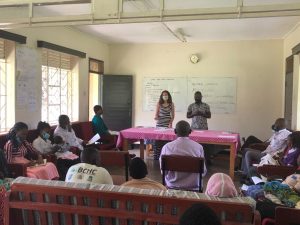Carolina’s Victoria Shelus Studies Antimalarial Drug Use and Practice at Drug Shops in Uganda
August 13, 2022Institute for Global Health and Infectious Diseases

Victoria Shelus leads an educational session in Uganda during her research trip. (Photo courtesy the UNC Institute for Global Health and Infectious Diseases)
In the remote villages of Bugoye sub-county at the foot of Uganda’s Rwenzori Mountains, a rolling landscape stretches across lush river valleys and steep hillsides. It’s the kind of terrain that might make for a beautiful and strenuous weekend hike for visitors but not necessarily for the people who live there. Residents of this region walk up and down the steep mountainsides throughout their days, at times descending over 1,000 feet to collect water in valley rivers and streams. A visit to the closest clinic or health center can be an arduous journey. This is also malaria country.
“To get to a health center, you may have to hike down a mountain, then take a motorcycle, then walk, perhaps for hours, depending on where you’re coming from,” said Victoria Shelus ’22 (Ph.D.), who conducted her dissertation research as a Fulbright-Fogarty Fellow last year through a partnership between Mbarara University of Science and Technology (MUST) and UNC-Chapel Hill.
“Even when they do reach the health center, the necessary tests, procedures, or medications are often not available.”
That’s why private drug shops have become the first point-of-call for health care delivery, selling over-the-counter medications, including antimalarials.
“Drug shops are much more flexible than the public health centers which close in the afternoon and frequently run out of medications. Drug shops are typically located in the villages, are always open, and can offer relatively quick and personalized care.”
Drug shops also sell rapid diagnostic tests for malaria. Because there are many other causes of fever, including viral infections, the World Health Organization and Uganda’s Ministry of Health recommend that all suspected malaria cases be confirmed prior to treatment, a policy known as “test and treat.” Overtreatment drives malaria resistance and wastes limited resources. It can also delay treatment for other causes of fever.
Building on the work of Dr. Ross Boyce through the UNC Institute for Global Health and Infectious Diseases, Shelus set out to understand client and vendor health behaviors and practices at the drug shops. A previous study had confirmed more than half of all antimalarials administered in the sub-county were coming from drug shops.
“Malaria symptoms can start very general and nonspecific, with fever, chills and muscle aches. And there are many things that can cause these symptoms. We wanted to know more about drug shop practices, and specifically how many people who were buying antimalarials there were getting tested first, and then how many people who bought these medications actually had malaria, rather than something else.”
Starting in the Bugoye Village
For eight months in 2021, Shelus made her home at Bugoye Health Center, a tidy compound of one-story buildings on a dirt road lined with small shop stalls and mud-thatched homes. It was here that Shelus shared living space with other visiting students and faculty and got to know the research team she would be working with for the study.
The Bugoye Health Center is one of the keystone partnership sites of what is informally known as the MUST-UNC Research Collaboration. Led by Dr. Ross Boyce and Dr. Edgar Mulogo, chair of the MUST Department of Community Health, the collaboration has been conducting research on malaria and other infectious diseases in rural western Uganda since 2013. The collaboration also works closely with a local non-profit P-HEALED (People’s Health and Economic Development), a partner organization that provides needed clinical services and advises institutions about local issues and priorities to ensure that academic research and programs are rooted in the population’s needs.
“I don’t think she could have accomplished all that she did without being on the ground every day. It’s a credit to her – I suspect she didn’t have a warm shower for months – but also the unique nature of our relationship with the local community. None of that would be possible without the infrastructure investments we’ve made to accommodate students and trainees in the community.”
Training shop vendors
The work began with training sessions for drug shop vendors on study data collection methods and instruction on how to draw blood samples. Then, between July and September 2021, each drug shop collected data from clients. Finger-prick blood samples were collected from clients who purchased antimalarials for themselves without rapid diagnostic testing.
“The data collected by vendors allowed us to estimate the proportion of clients who purchased a diagnostic test, and among those with a test, the proportion who adhered to the result. Because the vendors collected blood samples, we also estimated the proportion of clients who received antimalarials without having laboratory-confirmed malaria,” said Victoria.
This story was originally published by UNC Institute for Global Health and Infectious Diseases.
